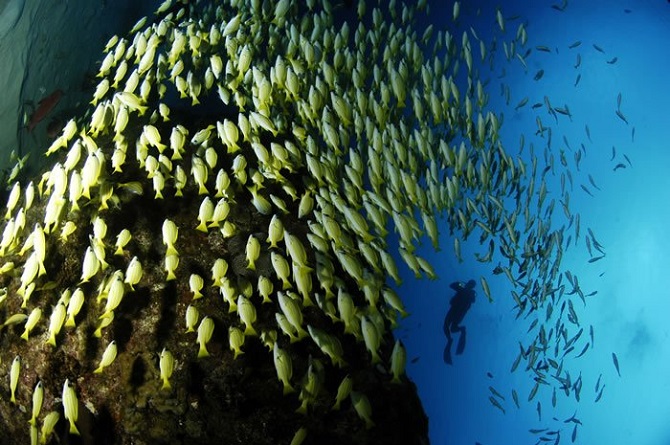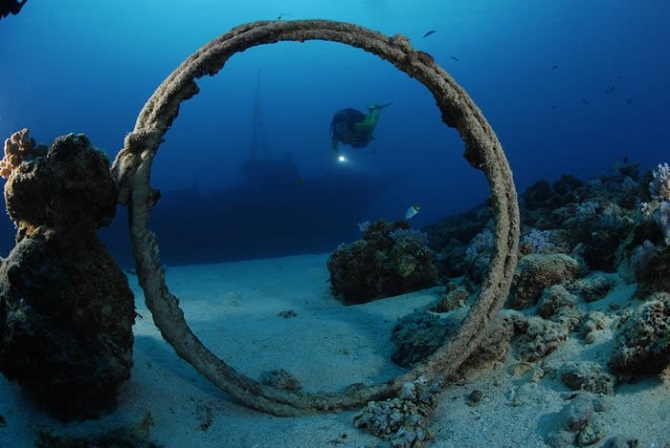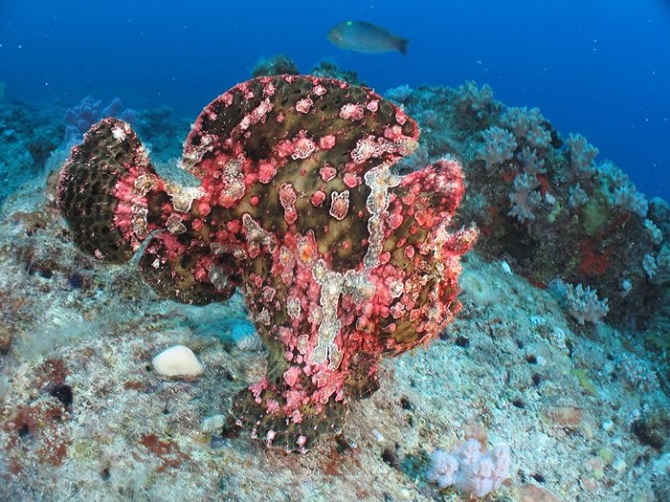Diving
Diving
With 330 kilometres of coastline encircled by a coral barrier reef that protects the turquoise lagoons of the island, Mauritius offers exclusive diving experiences to its visitors all year round.
Divers Favourites
With its safe lagoons stretching up to the barrier reef, its passes, drop-offs and wrecks, the island provides a wide variety of dives for both beginners and those with more experience.
Don’t miss the Cathedral - one of the most popular dives in Mauritius. Located off Flic- en- Flac on the west coast of the island the beauty of the surroundings is incredible. Other popular spots include Gunner's Coin, where you can see large parrotfish at each dive; Whale Rock (26 to 38 meters deep) where the lucky ones can come face to face with a hammerhead shark; and Holt's Rocks (16 to 25 meters deep) whose name suggests the formation of huge rocks under the sea. For the Beginner, head to the Blue Bay Marine Park in the South East - ideal for those just starting out.
What is unique to diving in Mauritius is the proximity to shore. Although most of the more challenging dive sites are found outside of the barrier reef, they are still invariably reached with just a 20-minute boat ride.
Preservation as a Priority
Mauritian and Rodriguan dive centres place a lot of emphasis on the preservation of the Indian Ocean’s fragile, sub-aquatic landscape. You won’t find yourself clamouring for space at a crowded dive site here. Nor will you see boats being anchored – thus potentially breaking up a precious section of coral. Mooring buoys are used instead, in line with Mauritius Scuba Diving Association (MSDA) guidelines.


Diving Locations
North / north-west region
A wide variety of dives: The northern region offers some fascinating dives from depths of just 13 metres. Colourful corals, abundant aquatic life and wrecks scuttled in order to create artificial reefs all provide a platform for year-round diving here.
West / south-west region
Canyons, caves and chimneys: The west is the lee shore of Mauritius and, as such, enjoys the benefits of a year-round micro-climate. In this area, all dives are performed outside the barrier reef. The underwater landscapes of Flic -en- Flac have been formed by the currents; here, one will discover canyons, chimneys and an impressive array of caves. Further down, close to Le Morne Mountain and up to Black River, the coral sites are more colourful than on the east coast and are often visited by dolphins.
East / south-east region
A spectacular concentration of species: Just off the east coast, the beautiful lagoon that runs along the coast is scattered with numerous passes through the reef, providing easy access to the deep sea. These areas are rich in plankton and attract a wide variety of pelagic species. Of all the passes, the Belle Mare Pass is arguably the most stunning. Diving here is a real experience due to the strong currents that exist around it and the spectacular concentration of fish and invertebrate life it draws as a result.
Specials: Night diving, 'honeymoon' diving and training sessions, of international standards, are all available in Mauritius.
Visit our Diving centers directory.

Security & Training
The Mauritian Scuba Diving Association (MSDA) oversees the 30 or so diving centres that are spread across Mauritius and Rodrigues. Remember to choose a centre that is affiliated for the safest possible diving experience.
All of these centres are affiliated to international organisations such as the Professional Association of Diving Instructors (PADI) and the World Confederation of Underwater Activities (CMAS), which deliver internationally-recognised training and diplomas.
A decompression chamber is available at the Candos hospital near the city of Quatre- Bornes (tel: +230 427 5131).
If you have any decompression concerns following a dive, do not hesitate to contact the diving centre or call the emergency service of SAMU by dialling 114.
Visit Mauritius Scuba Diving Association (MSDA) website
Tourists are informed that health services are not free in Mauritius. The use of the hyperbaric decompression chamber is chargeable and tourists will have to pay the appropriate fee before treatment is received. The cost for treatment carried out in the hyperbaric decompression chamber is 10,000 MUR per session. It is recommended that tourists are accompanied by their diving instructor / dive leader upon admission at the hospital.

